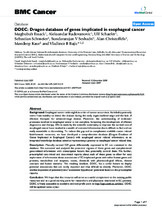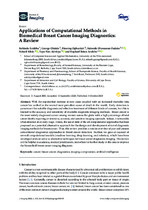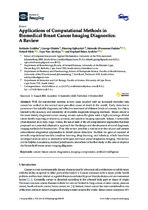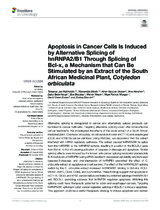DDEC: Dragon databaseof genes implicated in esophageal cancer

View/
Date
2009Author
Essack, Magbubah
Radovanovic, Aleksander
Schaefer, Ulf
Schmeier, Sebastian
Seshadri, Sundararajan V.
Christoffels, Alan
Kaur, Mandeep
Bajic, Vladimir B.
Metadata
Show full item recordAbstract
Esophageal cancer ranks eighth in order of cancer occurrence. Its lethality primarily stems from inability to detect the disease during the early organ-confined stage and the lack of effective therapies for advanced-stage disease. Moreover, the understanding of molecular processes involved in esophageal cancer is not complete, hampering the development of efficient diagnostics and therapy. Efforts made by the scientific community to improve the survival rate of esophageal cancer have resulted in a wealth of scattered information that is difficult to find and not easily amendable to data-mining. To reduce this gap and to complement available cancer related bioinformatic resources, we have developed a comprehensive database (Dragon Database of Genes Implicated in Esophageal Cancer) with esophageal cancer related information, as an integrated knowledge database aimed at representing a gateway to esophageal cancer related data.
Manually curated 529 genes differentially expressed in EC are contained in the database. We extracted and analyzed the promoter regions of these genes and complemented gene-related information with transcription factors that potentially control them. We further, precompiled text-mined and data-mined reports about each of these genes to allow for easy exploration of information about associations of EC-implicated genes with other human genes and proteins, metabolites and enzymes, toxins, chemicals with pharmacological effects, disease concepts and human anatomy. The resulting database, DDEC, has a useful feature to display potential associations that are rarely reported and thus difficult to identify. Moreover, DDEC enables inspection of potentially new 'association hypotheses' generated based on the precompiled reports. We hope that this resource will serve as a useful complement to the existing public resources and as a good starting point for researchers and physicians interested in EC genetics.
Collections
Related items
Showing items related by title, author, creator and subject.
-
Applications of Computational Methods in Biomedical Breast Cancer Imaging Diagnostics: A Review
Aruleba, Kehinde (MDPI, 2020)With the exponential increase in new cases coupled with an increased mortality rate, cancer has ranked as the second most prevalent cause of death in the world. Early detection is paramount for suitable diagnosis and ... -
Applications of computational methods in biomedical Breast cancer imaging diagnostics: A review
Aruleba, Kehinde; Obaido, George; Ogbuokiri, Blessing (MDPI, 2020)With the exponential increase in new cases coupled with an increased mortality rate, cancer has ranked as the second most prevalent cause of death in the world. Early detection is paramount for suitable diagnosis and ... -
Apoptosis in cancer cells is induced by alternative splicing of hnrnpa2/b1 through splicing of bcl-x, a mechanism that can be stimulated by an extract of the South African medicinal plant, cotyledon orbiculata
Meye, Mervin; Makhafola, Tshepiso Jan; Mbele, Mzwandile (Frontiers Media S.A., 2020)Alternative splicing is deregulated in cancer and alternatively spliced products can be linked to cancer hallmarks. Targeting alternative splicing could offer novel effective cancer treatments. We investigated the effects ...



